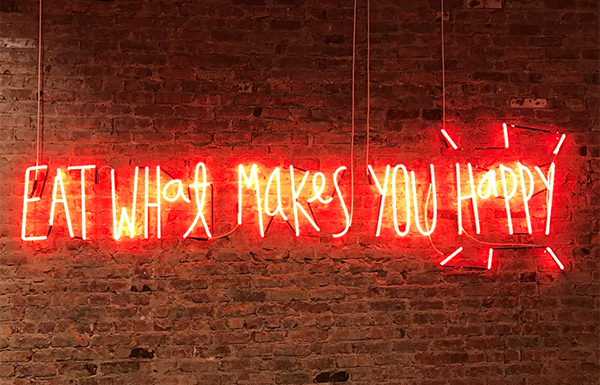
Well y’all, it’s May, and you know what that means—the flowers are blooming, the weather is finally warming up, and the media is hurling articles with headlines like “Drop Ten Pounds Fast!” “Five Foods to Fight Fat” and “The Best Tips to Get Your Ideal Summer Bod!!” at us like there’s no tomorrow.
I’m intimately familiar with these articles—I’ve probably read hundreds of them over the course of the ten years I spent expending all of my mental and physical energy in a quest to improve my body. From Weight Watchers at age 12, to calorie counting, to a life-ruining Whole30 which led to years of restriction, I’ve tried just about every diet under the sun and consider myself a veteran of food obsession and body shame.
Luckily, I found a path away from my negative food behaviors in the form of “intuitive eating”, a food philosophy that promotes following internal hunger and fullness cues rather than rigid external dietary regimens. Now, I can’t help but roll my eyes when I notice those articles and want to help lift up other women when I hear them make negative comments about their body sizes and summer diets.
To try to combat some of the summer body craze and add a reasonable voice to the discussion, I sat down with Kylie Mitchell, MPH, RN, LD, a non-diet dietitian, blogger at Yeah…ImmaEatThat, and intuitive eating advocate who recovered from an eating disorder herself and is now fighting the good fight against diet culture.
Get a peek into Kylie’s thoughts on intuitive eating, body positivity, and the advice she’d give herself as a college student if she could do it all over again. I found her words during our conversation and on her blog to be a wonderful antidote to all of the voices telling me that if I just cut out dairy and do one more plank, I’ll finally get that summer body that should be every woman’s ultimate goal.
On Why She Became an RD and Started Her Blog
I pursued becoming an RD and blogger because I had an eating disorder. I was curious about why I was so obsessed with food, my body and weight. For 3 years in college I didn’t want to get into a nutrition field, because I knew that would mean I’d have to face my eating issues.
After 5 years of working on myself and my ED, I knew I was in a good place, but I didn’t think I would ever work in eating disorders. My last rotation for my masters/dietetic internship was a specialty rotation that I got to choose. I decided to intern at a private practice that specialized in EDs. I realized while working there that I was recovered from my ED and I could help people struggling with disordered eating/eating disorders not have to fear feeding their bodies and help them make eating less complicated.
On Her Personal Food Philosophy
Eat satisfying foods!
On Her Exercise Philosophy
Move because you love your body, not because you hate your body and want to change it.
On What it Means to Eat Intuitively
Feeding your body shouldn’t be any more complicated than peeing or breathing. We live in a culture that makes feeding one’s body so complicated. I don’t think we need to fear feeding our bodies. Eating intuitively encourages people to be get back in touch with how natural eating should be. It encourages people to initially increase awareness of their behaviors with food (i.e. tuning into hunger and fullness cues, learning effective ways to cope with emotions rather than only using food for comfort, identifying food rules that take away from living a joyful life, etc.), so that over time, eating can become less complicated again.
On “Health at Every Size”
HAES encourages people to stop focusing on body size and instead focus on practicing health promoting behaviors (i.e. tuning into hunger and fullness cues, finding joyful movement you can do). For instance, activity in and of itself is health promoting, regardless of whether or not people lose weight. It helps lower glucose, it helps lower blood pressure, it increases muscle mass—it’s fabulous! HAES gets the focus off weight loss, since a focus on weight loss hasn’t been shown to be an effective motivator for improving health.
On the Trend of “Clean Eating” and “Lifestyle Changes” Like Whole30
Not everyone who does “clean eating”/Whole 30/paleo will develop disordered eating. But overall, I think eating patterns that eliminate entire food groups can contribute to a restrict-overeat cycle that can interfere with one’s quality of life.
On Body Positivity
I believe that positive body image isn’t loving your body, it’s thinking of your body less because you’re too busy living out or working on creating a vibrant life. Since fat isn’t valued in the culture we live in, I don’t think I’ll ever look in the mirror and think, “oh my gosh I love that fat on my arm.” Or, “I love the way there is cellulite on that part of my thigh.”
When I come across messages saying that we should all be trying to “love our bodies,” it never sits quite right with me. For me, since loving something means I think about it a ton, body love isn’t what I’m going for. I don’t want to sit around all day thinking about my body. I want to be spending my brain space doing awesome things.
Our body is our paintbrush, not our masterpiece.
I don’t think we have that much control over our body size. Therefore, I believe spending your life pouring your energy into trying to change or control your body size will likely lead to an unfulfilling life.
On College Diet Culture and the Freshman 15
The “Freshman 15” is really just a woman/man transitioning from their teenage body into their adult body. Not many people are meant to stay at their high school weight. Our thin-obsessed, diet culture has taken something that is a side effect of being a human (hello, bodies change) and turned it into something we should feel shameful about. I think college women and recent grads can maintain healthy food philosophies by realizing that gaining weight when you go to college is no different than gaining knowledge and gaining friends in college…it’s just part of life.
On the Advice She’d Like to Give Her College Self
GO SEE A FREAKING THERAPIST! Also, let yourself fail a class as part of exposure therapy to process perfectionism (aka finding way too much value in getting excellent grades and having everything look perfect on the outside).
On Raising a Daughter with a Healthy Food Philosophy
My tip for raising a daughter with healthy food philosophies would be to create a home environment free of dieting and instill in her that she is not less valuable if she takes up more space in the world. I hope that for my daughter, eating isn’t any more complicated than breathing. I hope that it’s natural and she doesn’t overthink it.
If you’re curious about intuitive eating, check out Kylie’s blog and the Food Psych podcast for more information about healthy eating behaviors.









